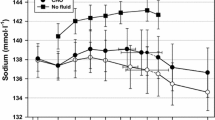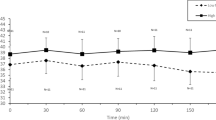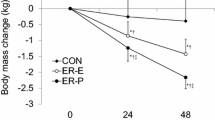Abstract
To investigate how differing moderate sodium chloride concentrations affect rehydration after exercise and subsequent exercise capacity, eight males lost 1.98 ± 0.1% body mass exercising in the heat, then consumed one of four drinks in a volume equivalent to 150% of mass loss. Drinks were identical except for sodium chloride content (1 ± 1, 31 ± 1, 40 ± 1, 50 ± 1 mmol/l). After 4 h recovery subjects cycled for 5 min at 70% \( \dot{V} {\text{O}}_2 \)peak then at 95% \( \dot{V} {\text{O}}_2 \)peak until volitional fatigue. Urine output was inversely related to sodium intake: more was produced with the 1 than the 40 and 50 mmol/l drinks (P < 0.01). Time to exhaustion in the exercise capacity test was not different between treatments (P = 0.883). The addition of 40 or 50 mmol/l of sodium chloride to a rehydration beverage reduced subsequent urine output, thereby providing more effective rehydration than a sodium-free drink. This did not, however, result in improved performance 4 h after the end of the rehydration period.





Similar content being viewed by others
References
Backx K, van Someren KA, Palmer GS (2003) One hour cycling performance is not affected by ingested fluid volume. Int J Sport Nutr 13:333–342
Barr SI (1999) Effects of dehydration on exercise performance. Can J Appl Physiol 24:164–172
Below PR, Mora-Rodriguez R, Gonzalez-Alonso J, Coyle EF (1995) Fluid and carbohydrate ingestion independently improve performance during 1 h of intense exercise. Med Sci Sports Exerc 27:200–210
Burge CM, Carey MF, Payne WR (1993) Rowing performance, fluid balance, and metabolic function following dehydration and rehydration. Med Sci Sports Exerc 25:1358–1364
Buskirk ER, Iampietro PF, Bass DE (1958) Work performance after dehydration: effects of physical conditioning and heat acclimatization. J Appl Physiol 12:189–194
Caldwell JE, Ahonen E, Nousiainen U (1984) Differential effects of sauna-, diuretic-, and exercise-induced hypohydration. J Appl Physiol 57:1018–1023
Costill DL, Sparks KE (1973) Rapid fluid replacement following thermal dehydration. J Appl Physiol 34:299–303
Craig EN, Cummings EG (1966) Dehydration and muscular work. J Appl Physiol 21:670–674
Coyle EF (2004) Fluid and fuel intake during exercise. J Sports Sci 22:39–55
Dill DB, Costill DL (1974) Calculation of percentage changes in volumes of blood, plasma, and red cells in dehydration. J Appl Physiol 37:247–248
Gonzalez-Alonso J, Heaps CL, Coyle EF (1992) Rehydration after exercise with common beverages and water. Int J Sports Med 13:399–406
Greenleaf JE (1992) Problem: thirst, drinking behavior, and involuntary dehydration. Med Sci Sports Exerc 24:645–656
Greenleaf JE, Sargent F (1965) Voluntary dehydration in man. J Appl Physiol 20:719–724
Heaps CL, Gonzalez-Alonso J, Coyle EF (1994) Hypohydration causes cardiovascular drift without reducing blood volume. Int J Sports Med 15:74–79
Hubbard RW, Szlyk PC, Armstrong LE (1990) Influence of thirst and fluid palatability on fluid ingestion during exercise. In: Lamb DR, Gisolfi CV (eds) Perspectives in exercise science and sports medicine. Benchmark Press, Carmel, pp 39–95
Lambert CP, Costill DL, McConell GK, Benedict MA, Lambert GP, Robergs RA, Fink WJ (1992) Fluid replacement after dehydration: influence of beverage carbonation and carbohydrate content. Int J Sports Med 13:285–292
Maughan RJ, Leiper JB (1993) Post exercise rehydration in man: effects of voluntary intake of four different beverages. Med Sci Sports Exerc 25:1358–1364
Maughan RJ, Leiper JB (1995) Sodium intake and post-exercise rehydration in man. Eur J Appl Physiol 71:311–319
Maughan RJ, Owen JH, Shirreffs SM, Leiper JB (1994) Post-exercise rehydration in man: effects of electrolyte addition to ingested fluids. Eur J of Appl Physiol 69:209–215
Maughan RJ, Leiper JB, Shirreffs SM (1996) Restoration of fluid balance after exercise-induced dehydration: effects of food and fluid intake. Eur J Appl Physiol 73:317–325
Maughan RJ, Merson SJ, Broad NP, Shirreffs SM (2004) Fluid and electrolyte intake and loss in elite soccer players during training. Int J Sport Nutr Exerc Metab 14:333–346
Maughan RJ, Shirreffs SM, Leiper JB (2007) Errors in the estimation of hydration status from changes in body mass. J Sports Sci 25:797–804
McConell GK, Burge CM, Skinner SL, Hargreaves M (1997) Influence of ingested fluid volume on physiological responses during prolonged exercise. Acta Physiol Scand 160:149–156
Mitchell JB, Grandjean PW, Pizza FX, Starling RD, Holtz RW (1994) The effect of volume ingested on rehydration and gastric emptying following exercise-induced dehydration. Med Sci Sports Exerc 26:1135–1143
Mitchell JB, Phillips MD, Mercer SP, Baylies HL, Pizza FX (2000) Postexercise rehydration: effect of Na(+) and volume on restoration of fluid spaces and cardiovascular function. J Appl Physiol 89:1302–1309
Montain SJ, Coyle EF (1992) Influence of graded dehydration on hyperthermia and cardiovascular drift during exercise. J Appl Physiol 73:1340–1350
Nielsen B, Sjogaard G, Ugelvig J, Knudsen B, Dohlmann B (1986) Fluid balance in exercise dehydration and rehydration with different glucose-electrolyte drinks. Eur J Appl Physiol 55:318–325
Passe DH (2001) Physiological and psychological determinants of fluid intake. In: Maughan RJ, Murray R (eds) Sports drinks: basic science and practical aspects. CRC Press, Boca Raton, pp 45–87
Passe DH, Horn M, Murray R. (2000) Impact of beverage acceptability on fluid intake during exercise. Appetite 35:219–229
Pitts GC, Johnson RE, Consolazio FC (1944) Work in the heat as affected by intake of water, salt and glucose. Am J Physiol 142:253–259
Robinson TA, Hawley JA, Palmer GS, Wilson GR, Gray DA, Noakes TD, Dennis SC (1995) Water ingestion does not improve 1-h cycling performance in moderate ambient temperatures. Eur J Appl Physiol Occup Physiol 71:153–160
Saltin B (1964a) Aerobic and anaerobic work capacity after dehydration. J Appl Physiol 19:1114–1118
Saltin B (1964b) Circulatory response to submaximal and maximal exercise after thermal dehydration. J Appl Physiol 19:1125–1132
Sawka MN, Pandolf KB (1990) Effects of body water loss on exercise performance and physiological functions. In: Gisolf CV, Lamb DR (eds) Perspectives in exercise science and sports medicine. Benchmark Press, Indianapolis, pp 1–38
Sawka MN (1992) Physiological consequences of hypohydration: exercise performance and thermoregulation. Med Sci Sports Exerc 24:657–670
Sawka MN, Noakes TD (2007) Does dehydration impair exercise performance? Med Sci Sports Exerc 39:1209–1217
Shirreffs SM, Maughan RJ (1997a) Restoration of fluid balance after exercise-induced dehydration: effects of alcohol consumption. J Appl Physiol 83:1152–1158
Shirreffs SM, Maughan RJ (1997b) Whole body sweat collection in man: an improved method with some preliminary data on electrolyte composition. J Appl Physiol 82:336–341
Shirreffs SM, Maughan RJ (1998) Volume repletion after exercise-induced volume depletion in humans: replacement of water and sodium losses. Am J Physiol 274:F868–F875
Shirreffs SM, Taylor AJ, Leiper JB, Maughan RJ (1996) Post-exercise rehydration in man: effects of volume consumed and drink sodium content. Med Sci Sports Exerc 28:1260–1271
Shirreffs SM, Armstrong LE, Cheuvront SN (2004) Fluid and electrolyte needs for preparation and recovery from training and competition. J Sports Sci 22:57–63
Shirreffs SM, Watson P, Maughan RJ (2007) Milk as an effective rehydration drink. Br J Nutr 98:173–180
Takamata A, Mack GW, Gillen CM, Nadel ER. (1994) Sodium appetite, thirst, and body fluid regulation in humans during rehydration without sodium replacement. Am J Physiol 266:R1493–R1502
Walsh RM, Noakes TD, Hawley JA, Dennis SC (1994) Impaired high-intensity cycling performance time at low levels of dehydration. Int J Sports Med 15:392–398
Wemple RD, Morocco TS, Mack GW (1997) Influence of sodium replacement on fluid ingestion following exercise-induced dehydration. Int J Sport Nutr 7:104–116
Wong SH, Williams C, Adams N (2000) Effects of ingesting a large volume of carbohydrate-electrolyte solution on rehydration during recovery and subsequent exercise capacity. Int J Sport Nutr 10:375–393
Yoshida T, Takanishi T, Nakai S, Yorimoto A, Morimoto T. (2002) The critical level of water deficit causing a decrease in human exercise performance: a practical field study. Eur J Appl Physiol 87:529–534
Author information
Authors and Affiliations
Corresponding author
Rights and permissions
About this article
Cite this article
Merson, S.J., Maughan, R.J. & Shirreffs, S.M. Rehydration with drinks differing in sodium concentration and recovery from moderate exercise-induced hypohydration in man. Eur J Appl Physiol 103, 585–594 (2008). https://doi.org/10.1007/s00421-008-0748-0
Accepted:
Published:
Issue Date:
DOI: https://doi.org/10.1007/s00421-008-0748-0




